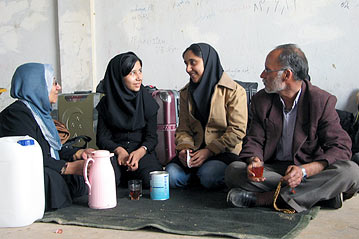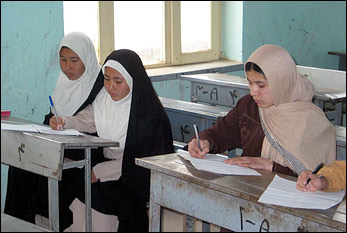Afghan New Year signals new returns, new challenges
Afghan New Year signals new returns, new challenges

HERAT, Afghanistan, March 21 (UNHCR) - In Afghanistan and Iran, New Year, or naw roz, which is celebrated today, marks the end of winter, with the rising temperatures and melting snows signalling a new season of activity.
Among those on the move are Afghans who, after years and sometimes decades of living as refugees in Iran, have decided to return to their homeland.
At the UNHCR reception centre in Islam Qala, western Afghanistan, Ali Fatahi and his family are drinking tea surrounded by their luggage. They have travelled by bus through the night from Tehran, where Ali and his wife lived for the past 25 years and where their six children were born. His daughters appear tired from the journey and the apprehension of adjusting to life in a new and, to them, foreign country. Asked how she feels to be in Afghanistan, 16-year-old Leyla looks surprised. "Are we in Afghanistan now?" she asks her father.
The Fatahi family is among the more than 1 million Afghans who have returned from Iran since the UN refugee agency began its voluntary repatriation programme in 2002. The harsh winter means that just 3,100 people have sought UNHCR assistance to return from Iran since the beginning of this year.
For Ali, the decision to return home after more than a quarter of a century was a complex one, based on his belief that conditions in Afghanistan were improving and his perception that he faced growing obstacles in Iran.
"We were always treated well," he says. "But during the past year it has become more difficult. Finding work has become harder and last year I couldn't afford to send my daughters to school."
As he waits at the reception centre for the truck carrying his and other returnees' belongings, he discusses his plans for the future. "I have some savings and I hope to open a garage in Sherbegan," he says, referring to a city in the north of the country.
As with other Afghans returning from Iran, the cost of moving the Fatahi family and their possessions to Afghanistan is covered by the UN refugee agency. Once inside the country, they can then claim a cash transportation grant based on the distance to their final destination. After such a long absence, Ali and his family are unsure of what awaits them. A scribbled mobile phone number represents their only contact in Sherbegan - Ali's father-in-law, whom none of them has seen for many years.
"Twenty-five years is a long time," says Ali. "But we always knew we would return once the security situation improved. Everybody wants a better life in their own country."
Repatriation from Iran, as well as Pakistan, is governed by a tripartite agreement between the host government, the government of Afghanistan and UNHCR. The agreement is based on the principle that all returns must be voluntary. With the current agreement with Iran due to expire at the end of this month, talks are ongoing to ensure its renewal.
For Afghans, naw roz also means the start of a new academic year. In an otherwise empty classroom on the outskirts of the western city of Herat, six students are preparing to enter the Afghan school system for the first time. The group varies in age from 12 to 20, but each member shares a common background. They were all born in Iran and have recently returned with their families. They understand the challenges of returning to a country where poverty, unemployment and lack of housing remain a reality for many.
Sixteen-year-old Ferishta returned six months ago and was immediately struck by her new surroundings. "We miss the facilities a lot. My school in Iran was more modern and we had computers. But here I am no longer a refugee," she says.
Her comments are picked up by 13-year-old Pakiza, who is attending the preparatory classes with her younger brother. "Here we have less, but it feels like it belongs to us."
"The role of UNHCR is to assist refugees to return to Afghanistan and to help them reintegrate into their places of origin," says Bernard Doyle, who is responsible for the agency's operations in the west of the country. "Conditions in Afghanistan have improved but it still faces tough challenges. UNHCR is working with the government of Afghanistan, other UN agencies and developmental partners to come up with long-term solutions to the issue of migration in the region."

Khawar is a widow who works as a cleaner in the school where her daughter is attending classes. She and her family left Iran six months ago. They own a small property in a rural district but have settled in Herat because of its greater employment prospects. For her, the process of returning to Afghanistan has been more difficult than expected. But she is certain she made the right decision.
"We struggled in Iran and we struggle here," she says. "But in our own homes we feel more comfortable."
By Tim Irwin in Herat, Afghanistan








